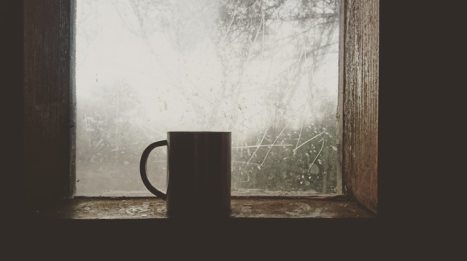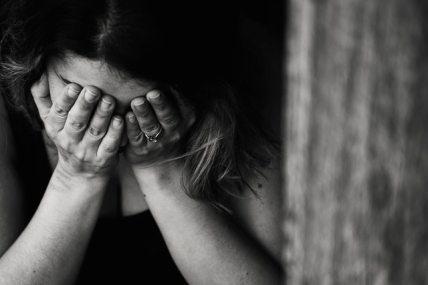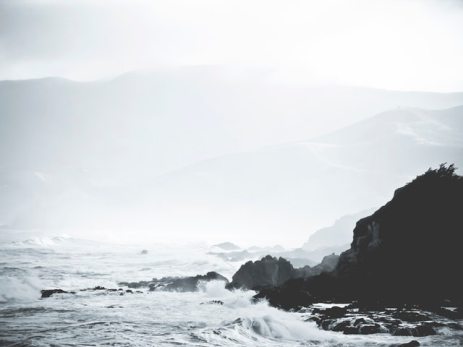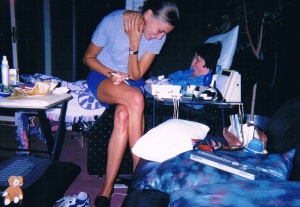Sometimes life taps you on the shoulder and whispers, take notice, this is important.
On Christmas Eve, my husband took our cat Mimi to the vet. She had a suspicious lump on the side of her face and a weepy eye. Looking back, it’s clear that this was not going to end well, but I was hopeful, or perhaps denial is the more appropriate word. Shortly after he sent me a text that sank my stomach to my knees. Call me right away.
I sobbed quietly in the kitchen while he explained the vet’s explanation. My children sat unaware in the other room. Our two cats had been our first “babies,” now beloved by our actual babies more than us. Changing diapers and raising humans rubbed the shine off our feline affections, I’m sorry to say. However, nothing like a terminal diagnosis to release a dam of guilt and love.
In furtive whispers we decided to wait before telling our children, especially our daughter who is six and two thirds (her words) and highly sensitive. There was an off chance that this was a non malignant lump. We decided to make an appointment for surgery. I think we both knew in our hearts euthanizing might be the more humane (not to mention practical) course, but neither of us was willing to make that call despite years of complaining about cat litter and hairballs.
On Sunday after a weekend celebration filled with family, laughter, and of course gifts, my husband took our daughter aside and told her the news. I heard her cries from where the kitchen and felt the sting of her pain, a layer of her innocence peeled back, at this first intimate exposure to disease and death.
She asked why, repeatedly, as she cried and we tried to answer her questions honestly, but also carefully because our girl suffers from anxiety, especially regarding illness. Not that surprising given she has celiac disease, but more than the average kid. We walked the line of truth on wobbly legs. We did our best, which ultimately, is all you can do as a parent, and really, as a human being.
At one point my husband said, “Death is an important part of life.” This phrasing seemed to agitate her. “Why important,” she asked looking confused.
I put my arm around her and pulled her close. “Death is part of life,” I said, removing the adjective before adding another. “And it’s very sad.”
After she dried her eyes, my husband asked if she wanted to spend the afternoon with Mimi, but she said no. Already I saw her edging back, in fear, but also as a form of self-protection. Adults do this, too. I saw it happen to my mother when she was diagnosed with multiple sclerosis at age forty. Some friends dropped back so far they disappeared. When she was dying, eighteen years later, I watched certain people approach her fearlessly, weeping at her bedside, resting their head against hers, while others remained on the periphery of the room, watching from a distance.
There is no right or wrong way to behave in the face of death. But my husband and I understood that this first introduction, the way we acted and reacted in the eye of this oncoming storm, would shape our daughter. At this point, death was a possibility not a certainty, so we didn’t push her. It was her idea to drive to Philadelphia and visit The Franklin Institute, one of our favorite museums. I asked her why even though I already knew. I already knew.
To see the heart, she said.
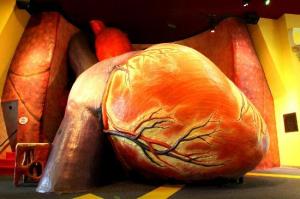
Oh, the heart. I hid my tears behind a hand as I thought about hearts, that precious fist shaped organ, the quiet steady force of life. When I think about hearts I always think of my mother’s, how hers beat on even after her lungs failed. I was sitting at her bedside when she stopped breathing. Her face turned blue, but most surprisingly, she smiled.
Then, with a sharp gasp the smile disappeared and she was back. We later learned later it was because her heart was so strong, so young. A few days later, it stopped, and she died peacefully in her sleep. But I will always remember how it didn’t want to quit, and it seemed a fitting metaphor for such a loving woman.
We agreed to drive to the museum, all of us nodding our heads in unison. It’s a good idea, I said. Better to leave the house and not mope around. Besides, poor Mimi would be better served sleeping peacefully than being pursued by our worried children.
It was overcast, the kind of day when the passage of time is elusive, the sky knitted thick with clouds. I put away my phone and took out my notebook. I wrote about the sky and my daughter. I wrote about the sun shining like a pale coin, and how it seemed to struggle through the clouds, elbowing its way out before falling back again.
We had a nice day. We walked through the heart twice, its methodical pounding amplified in our ears. There’s the left ventricle, I pointed out to my son who held my hand and walked ahead of me. His big sister ran through, already an expert at the steep stairs and all the twists and turns. I called out to her, wait for us, I said, not wanting to lose sight of her. Often she’s five steps ahead of me, in the heart and in life. I’m learning to let go bit by bit, but it’s hard.
The next day Mimi took a turn for the worse. She vomited in a sudden and violent way. There was blood all over the floor. My husband and I looked at each other horrified, knowing what that meant. For once I was grateful for the endless episodes of Angelina Ballerina. It gave us time to clean up the blood, to compose ourselves. To prepare for the next conversation.
Our girl took it hard. I wept beside her as I witnessed this next level of understanding. Later, though, I realized how lucky we are, how lucky she was that this first brush with death was an animal’s, as dear as she was to us, and not a parent or sibling. I knew it could be much, much worse.
But still.
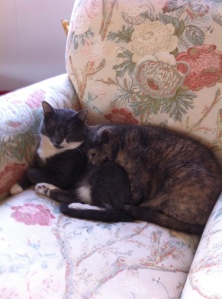
Mimi’s last day, December 30, 2014
The next day we spent inside, biding our time. The appointment with the vet was at 4:30. For the first time in days, my daughter approached Mimi. She was still cautious, but offered to sit with her to “keep her company.” I gave her a pad of paper and she sketched a portrait. She wanted to get Mimi just right and I think she did.
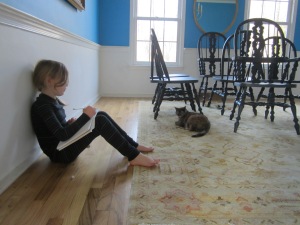
When it was time to say goodbye, I was a wreck, but my dear daughter was composed and full of compassion. She stayed in the play room with her father when he put Mimi into the carrier. She offered to walk Mimi to the car, crouching low so the cat could see her face and “not be afraid.” I stood at the window stifling my sobs, so proud and so heavy hearted.
Rest in peace sweet kind Mimi, always the gentlest of cats, with the most beautiful coat of caramel striped fur I’ve ever seen. We will miss you.
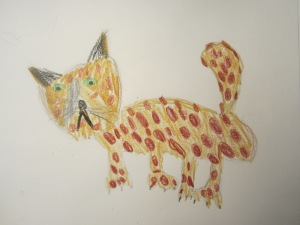
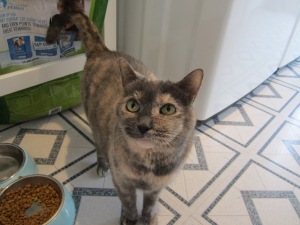
A cat of many names, given upon adoption as Nome
Shortened to Noemi, and renamed by our daughter, Mimi
Born 2005-Died 2014
Have you had to deal with a pet or family member’s death with your child? How did you handle it? Were there any books about grief that seemed to help?
